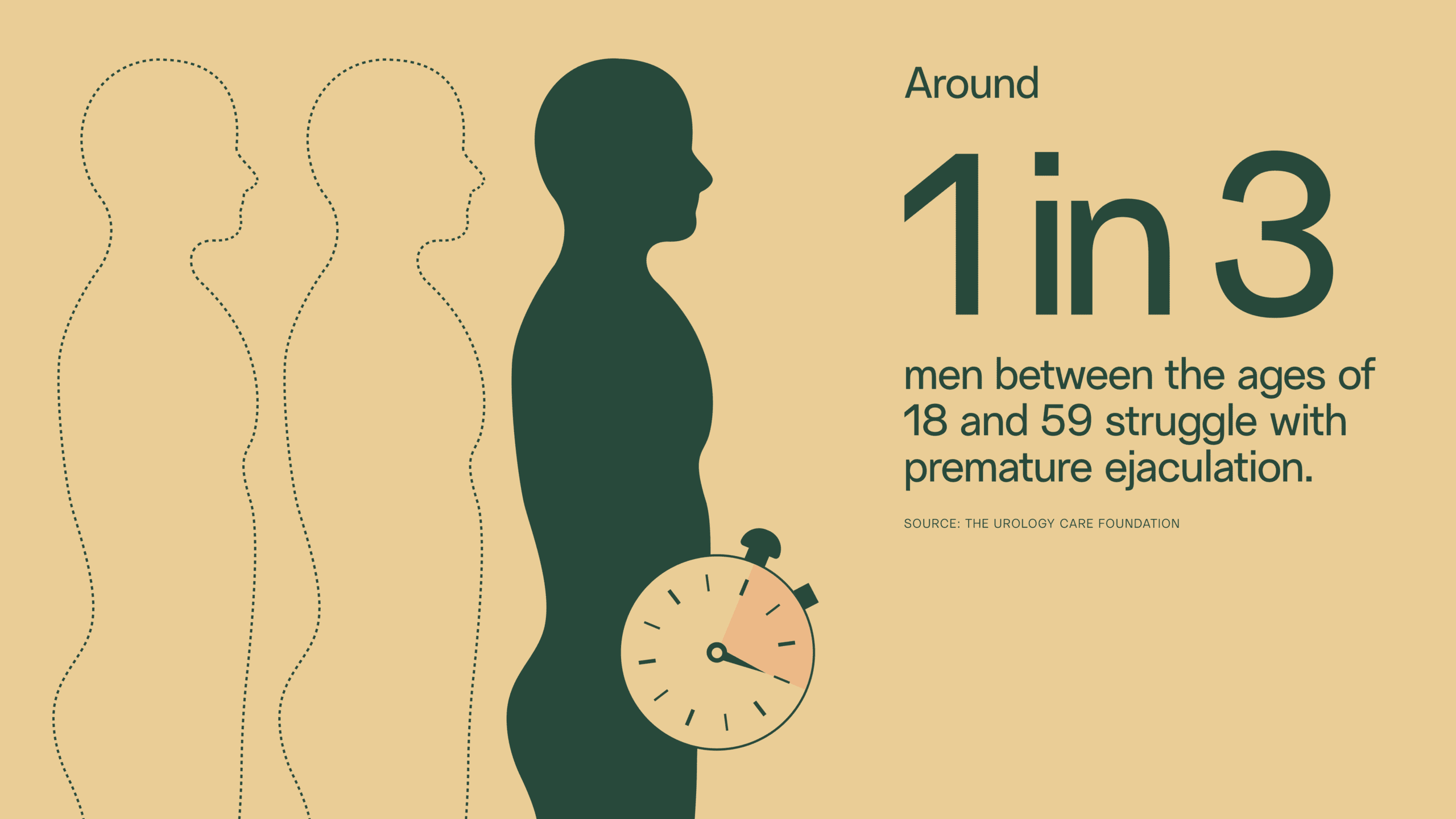The Urology Care Foundation advises about 1 in 3 men aged 18–59 have problems with premature ejaculation. Although it can be psychological, physical issues might play a role. Let’s understand what causes premature ejaculation, how it might correlate with fertility, and what to do about ejaculatory issues if you’re trying to conceive.
Key takeaways
- Premature ejaculation has different definitions, but in general, can be explained as lack of control over ejaculation, or regularly ejaculating before one wants to.
- Premature ejaculation won’t necessarily affect fertility, and isn’t a sign of infertility. However, if you’re ejaculating outside of the vagina, that can make it more difficult to conceive.
- A variety of psychological and physical techniques can treat the causes of premature ejaculation and help people last longer in bed.
What is premature ejaculation?
Over the years, there have been several definitions of premature ejaculation.
“The definition of premature ejaculation is ejaculation before the desired time frame for the patient and the partner, that’s creating stress and anxiety and the relationship,” explains Dr. Ramy Abou Ghayda, urologist and chief medical officer at Legacy.
“There are many time limits put on the definition,” says Dr. Ghayda. “Some people say less than a minute, and others say less than two minutes. So there is no exact definition.” The general rule of thumb, he concludes, is that premature ejaculation occurs when “someone ejaculates before they want to.”
What causes premature ejaculation?
There are two types of premature ejaculation:
- Primary premature ejaculation: It’s always been a problem.
- Secondary premature ejaculation: It has recently developed as a problem.
Primary premature ejaculation is often due to a psychological contributor, such as a traumatic sexual experience. Other psychogenic factors include depression, anxiety, lack of confidence, relationship problems, or unrealistic sexual expectation.

Secondary premature ejaculation could be due to psychological or physical factors. Physical causes of premature ejaculation include:
- Drinking too much alcohol
- Inflammation of the prostate gland (prostatitis)
- Inflammation of the urethra
- A hormonal imbalance affecting oxytocin, luteinizing hormone, prolactin, or thyroid stimulating hormones
- Low serotonin or dopamine levels (neurotransmitters in the brain)
Occasionally, premature ejaculation can happen in conjunction with erectile dysfunction. The anxiety of being unable to keep an erection can lead to early ejaculation.
Does premature ejaculation have an impact on male fertility?
The only concern around premature ejaculation and fertility is that those who ejaculate too early may not get the entirety of the ejaculation into the vagina.
“To conceive naturally, you need a good delivery of sperm inside the female reproductive tract,” explains Dr. Ghayda. “So if ejaculation happens very quickly, happens at the start of sexual intercourse, or the ejaculate isn’t getting inside the cervix, then this might create some problems when trying to conceive,” he says.
Premature ejaculation is not a sign of infertility. As long as all of the ejaculate is making it into the vagina, there’s no evidence that premature ejaculation affects sperm count, quality, or your chances of pregnancy.
If you are having difficulty trying to conceive, the best way to understand your fertility is a semen analysis. Sperm testing gives you the tools to understand and optimize your fertility.
How long should sex really last?
There’s no exact science to this — it’s up to you and your partner. But studies have found that, contrary to what many men think, women who are having penetrative sex don’t need it to be a marathon. Most women surveyed have indicated 3–7 minutes as “adequate” time for the intercourse portion of the event, which is more or less in line with the average length of penetration — 5.4 minutes.
More than 10 minutes of penetration? Most women surveyed rated this as too long.
Most women expect the entirety of the sexual experience to last around 20–25 minutes. But there’s certainly no expectation, or even preference, that penetration occupies the majority of this time — that measures includes foreplay, manual or oral sex, and other sexual interactions that may be equally, if not more pleasurable for female partners. (After all, only a small percentage of people with vaginas are able to orgasm from penetration alone.)
The bottom line: if you’re regularly ejaculating in just a few minutes, you may not need to stress about it at all. The key, as always, is to communicate with your partner, understand what they like, and work together to make the experience the best it can be for both of you.
How premature ejaculation may affect a relationship
“For many people, premature ejaculation is not a big deal. Not everyone finds it a problem when having sexual intercourse, and they might still be able to deliver some sperm if trying to conceive,” advises Dr. Ghayda. “It’s not related to low fertility status and isn’t a risk factor for infertility,” he adds.
But for some couples, it can affect relationship satisfaction. One or both partners might begin to avoid sex due to being embarrassed about premature ejaculation. Or it can cause feelings of low self-esteem, anxiety, anger, or depression, which then impact other areas of your relationship.
The critical thing is to talk about it with your partner. If you try to avoid sex, your partner might think it’s because of them. Although it may feel daunting to broach the topic, it can often be a relief for both partners to get it out in the open. If there is an underlying trauma, or you don’t feel comfortable speaking to your partner, you can always talk about it with a sex or relationship counselor present for support.
You don’t have to manage premature ejaculation on your own. Dr. Ghayda advises that “if premature ejaculation is causing a lot of stress, you can speak to your health care provider or urologist as there are treatment options available.”
Treatments for premature ejaculation
If you experience premature ejaculation, how can you last longer in bed. The good news: The Urology Foundation estimates that 95 out of 100 men can recover from premature ejaculation.
“Premature ejaculation may be due to a psychogenic factor, such as performance anxiety or not being comfortable with a partner,” says Dr. Ghayda. “Treatment for psychogenic premature ejaculation mainly involves sex counseling and trying to understand the root problem.”
Another treatment option is behavioral therapy to help a person build a tolerance to delay ejaculation through a series of exercises. Techniques include learning the “squeeze method” or “stop-start method” to help you gain more control over when you ejaculate.
There are also anesthetic or “numbing” creams, gels, and sprays to make your penis less sensitive. Your healthcare provider can recommend suitable products to use.
Dr. Ghayda also explained there are medications used for premature ejaculation, although that’s not specifically why they were developed. Antidepressants are used off-label to help those experiencing premature ejaculation.
“We don’t have an FDA-approved medication” specifically for premature ejaculation, Dr Ghayda says. “We use selective serotonin reuptake inhibitors (SSRIs) for their side effects. Antidepressants like paroxetine and fluoxetine have a side effect of delayed ejaculation. So we can use them to treat premature ejaculation.” It can take 1–2 weeks for SSRIs to take effect.
Other tips for delaying ejaculation include:
- masturbating 1–2 hours before sex
- using a thick condom to help decrease sensation
- having your partner on top during sex, allowing them to pull away when you’re close to ejaculating
These techniques are most applicable if you’re not currently trying to conceive.
Tips for trying to conceive with premature ejaculation
In addition to the treatments above, there are self-help techniques you can try if you want to delay ejaculation. These might be helpful if you are trying to conceive and want to make sure you have enough time to ejaculate inside the vaginal canal.
Self-help techniques to help delay ejaculation during procreative sex include:
- using distraction techniques
- taking breaks during sex
- numbing lubes
If you try these, sex is going well, and you’re still having problems conceiving — male fertility testing is the only way to assess your sperm health and identify any underlying fertility problems. Learn more about semen analysis.



